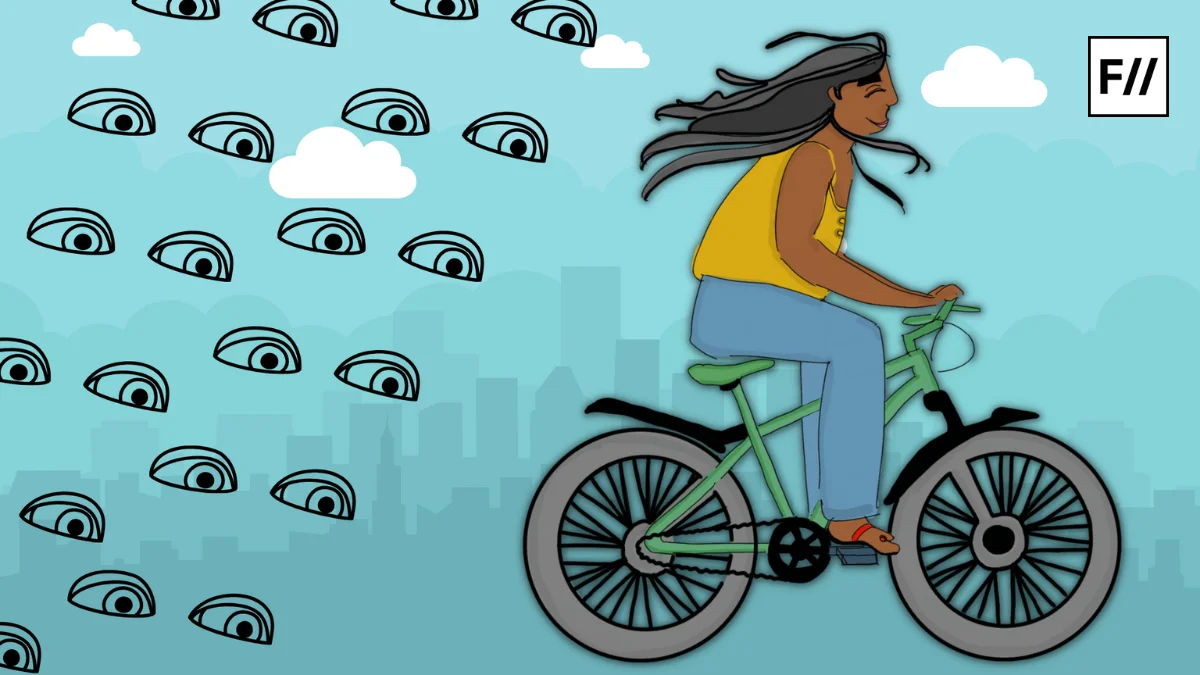With the Supreme Court overturning Roe V Wade in the US, the pertinent fear of unsafe abortions is seizing space in the discourse. As the United States did away with the right to abortion, though women all over the world collectively felt despair and helplessness, another feeling that Indians felt was the misplaced, collective, nationalistic pride.
The context of it is understood — the medical practice of abortion has been legal in India since the 1971 (Medical Termination of Pregnancy Act, 1971), and recent “progressive” amendments in the Act in 2021 (MTP Act (Amended) 2021)—expanded the access to safe and legal abortion services. But it is imperative to look inwards since unsafe abortion is still one of the leading causes of death of women of reproductive age.
With the Supreme Court overturning Roe V Wade in the US, the pertinent fear of unsafe abortions is seizing space in the discourse. As the United States did away with the right to abortion, though women all over the world collectively felt despair and helplessness, another feeling that Indians felt was the misplaced, collective, nationalistic pride.
A recent report by the UNFPA State of the World Population Report 2022: Seeing the Unseen reveals that approximately half of the world’s pregnancies are unintended, and 60% of them result in abortions. In India, the report stated, around 67% of abortions are unsafe and cause nearly eight deaths per day; abortion remains the 3rd leading cause of Maternal Deaths in India. World Health Organisation defines unsafe abortions as “the termination of unintended pregnancy either by persons lacking the necessary skills or in an environment lacking the minimum medical standards or both”.
India’s populace still lacks knowledge and awareness regarding contraception usage, thus using abortion as a way of limiting the family size or for spacing between pregnancies. For these women, probably the knowledge or the access to contraception is so compromised that unsafe abortions are thus the only methods of family planning available.
A recent report by the UNFPA State of the World Population Report 2022: Seeing the Unseen reveals that approximately half of the world’s pregnancies are unintended, and 60% of them result in abortions. In India, the report stated, around 67% of abortions are unsafe and cause nearly eight deaths per day; abortion remains the 3rd leading cause of Maternal Deaths in India. World Health Organisation defines unsafe abortions as “the termination of unintended pregnancy either by persons lacking the necessary skills or in an environment lacking the minimum medical standards or both”.
Another reason might be the lack of privacy, despite the MTP Act stipulating strict confidentiality. Women’s dignity, autonomy, and privacy concerning their reproductive choices are paramount but not seen as being respected by healthcare providers. The breach of confidentiality, before the amendment of the MTP Act 1971, was punishable by a fine of mere 1000 rupees.
The amendment of 2021 brought about many changes, making the Act seemingly liberal and progressive — but still missed the point. Increasing gestation period, changing the wording from “married women” to include unmarried women, and raising the punishment for violation of privacy — while these are definitely a step in the right direction, the devil is in the details.
Safe methods of abortions are rarely available at the local primary health centres and are concentrated mainly in the private, urban areas. Under the MTP Act 1971 and MTP Act (Amendment) 2021, it is stipulated that medical termination of pregnancy can be done by a registered medical practitioner who has either completed six months of surgery in gynaecology and obstetrics; or has experience working at a hospital in the practice of obstetrics and gynaecology for at least a year; or have assisted a registered medical practitioner for termination of pregnancy in at least 25 cases in a government-approved MTP hospital/training institution; or has a post-graduate degree/diploma in gynaecology and obstetrics.
Another reason might be the lack of privacy, despite the MTP Act stipulating strict confidentiality. Women’s dignity, autonomy, and privacy concerning their reproductive choices are paramount but not seen as being respected by healthcare providers. The breach of confidentiality, before the amendment of the MTP Act 1971, was punishable by a fine of mere 1000 rupees.
Around 66% of the nation’s population, according to the Rural Health Statistics Report (2019-20) by the Ministry of Health and Family Welfare, live in rural areas. There is an acute shortage of trained obstetrician-gynaecologists — of the required 5183 in the Community Health Centres (one per each centre), there is a shortfall of 3611.
The amended Act allows termination of pregnancy after the gestation period of 24 weeks, only based on the opinion of a medical board. Still, it does not assign a time — duration for the board to come up with a decision showing a subtle yet glaring apathy towards the time-sensitive aspect of termination of pregnancy and the issues that might arise from a delayed termination.
Reports suggest that despite liberal laws and policies, providers create unnecessary hindrances in the termination of a pregnancy. Many ask for third-party consent (from partner or parents/guardians) even when the law does not require anything of the sort if she is an adult of “sound mind”. This reflects society’s and even the medical fraternity’s notion that a woman is a dependent entity.
Abortion is stigmatised in India; many times, even doctors are found to be discouraging abortions on moral grounds and advise women to continue with their pregnancies, disregarding their agency and control over their own bodies. The MTP Act remains a doctor-centric law with significant portions of the decision-making resting in their hands; a technical team with no stake in the pregnancy and upbringing of a child has the most power and even veto over the women’s decision about her own body. When the decision lies in the hands of a third party, it is tinged by their personal worldview and beliefs — like their stance on mental health, pre-marital sex, sexual abuse, and such.
The 24-week gestation period is also sanctioned for cases of rapes. In situations of crossing the gestation limit, for any reason, this puts a pregnant woman through the hassles of court, adding to an unfortunate event’s trauma. Doctors, to save their skin from legal proceedings, also refuse abortions at times in case of minors or rape survivors — as it is required of them according to the Protection of Children from Sexual Offences (POCSO) Act 2012 to report a minor’s pregnancy to the police, regardless of consent. Additionally, courts, depending on the opinion of the medical boards, oft-times refuse minor rape victims.
A report (2019) by Pratigya, a Delhi-based NGO, noted, that these judgements are on the grounds of being “safe” for the rape victim to carry the pregnancy to delivery and even citing “lack of mental anguish,” which meant no risk to the mental wellbeing of the minor. More often, the reasoning is, going beyond the legally allowed gestation period. While termination is permitted at any time during the pregnancy if there is a risk to the woman’s life, the ‘risk’ is not elaborated upon, thus leaving it mainly to the doctors’ discretion.
The Indian court verdicts do not seem to factor in the negative impacts of early childbearing on a minor. According to a report (2020) by the World Health Organisation, pregnancy and related complications are among the leading causes of death among young adolescent girls aged 15-19 globally. They face a higher risk of eclampsia, puerperal endometritis, and systemic infections.
The undisputed power of the court and doctors also makes the MTP Act not inclusive in practice. It has been noted time and again that women from marginalised groups and rural backgrounds face the major brunt of having to undergo unsafe abortions due to the lack of a safe and accessible alternative. Abortions are also complicated for the trans community, due to the social stigma held by many within the medical fraternity. Since many abortion service providers ask to know about partners and/or family, the safe option also becomes challenging to access for women who work as sex workers or are single.
Unsafe abortions are largely preventable, thus all the more tragic. Since much of the addition to the statistics of unsafe abortion-related deaths or impairment originate from developing nations, the international bodies do not mobilise as they should—it may be because the victims are usually women of colour. Similarly, in the context of India, brimming to the edge with aspects of inequality—the passive actions in the face of enormous numbers of unsafe abortions related deaths probably can be because this primarily impacts the marginalised, the impoverished, and more specifically, women living in the rural parts, the most.
The situation is even more troublesome for trans men and non-binary individuals.
Also read: Manifesto 343: The Abortion Rights Movement By Women Who Spoke About Their Illegal Abortions In 1971
It is of utmost importance to train and license more practitioners in safe medical termination of pregnancy and maximise the accessibility to safe abortions. Strict stipulations of trained MTP providers in rural primary health centres should be maintained—a high level of dedication from the healthcare sector is required in this regard. The discourse of abortion in India is not as clear as the MTP Act might make it seem and requires a nuanced analysis of the complex socio-legal issues. The medical termination from the doctors and court should entirely move to the discretion of the pregnant woman—she has to have the veto on her body.
Also read: A Comprehensive History Of Abortion Laws In India: 1971-2021
Sapontara is a Women’s Studies major with a marked interest in the areas of Maternal Health, Menstrual Health, Law and Public Policy. As an Assamese, she is passionate about understanding the gender dynamics and nuances in her home state among the multiple ethnicities and tribes residing there. She loves researching, reading every sort of fiction she can lay her hands on, but most of all finds solace in black coffee and surfing through Pinterest.
Featured image source: DW




